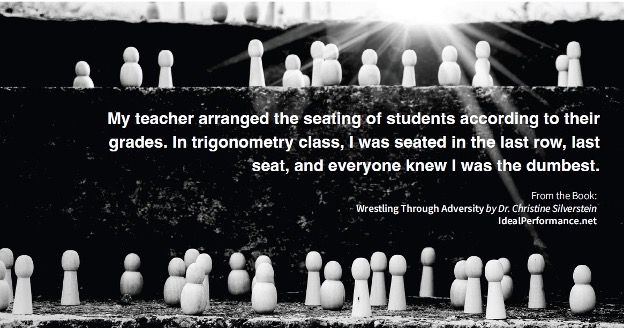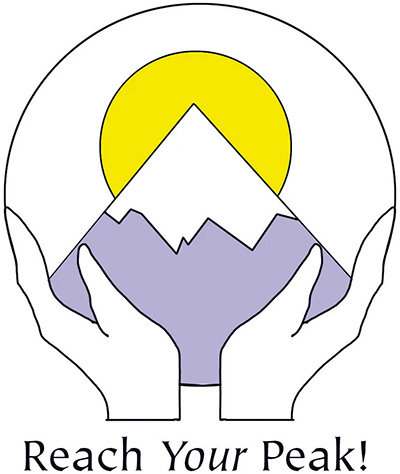Adapted from: Wrestling Through Adversity
Do you recall how you felt when, as a teenager, you were preparing for an important exam in your life, like the Scholastic Aptitude Test (SAT), and you secretly worried you would fail to get the high score you needed to get accepted into the school of your choice, whether it be a nearby local college or Harvard University? It wasn’t solely the questions on the exam that bothered you. Back then, underlying your fears, you might have believed that you were not smart enough to go to college or that you knew you were smart but got nervous when taking standardized tests and lost the focus to succeed.
With the expense of a college education these days, you want to get the best results and return on your investment and “pass the test” to become a nurse, doctor, engineer, journalist, or some other professional, but you convince yourself that there is too much competition. It’s too hard. This leads you to be filled with trepidation, so the opportunity may pass by because these fears can test your resolve long before the exam, as if scoring high on the SAT isn’t challenging enough.
Looking back to the future
When I reflect on my early childhood experiences, I remember excelling at school except for having challenges with reading comprehension on standardized tests in the 6thgrade. I remember my father looking at my report card and asking me about my low grade, but nothing was done at school. However, my dad reminded me how reading was fun and encouraged me to read books from the library while giving me a dollar a book for incentive.

Another issue I had in high school math was with a teacher who was punitive when I did not have the correct answers on my homework and placed me according to my low grade on a test in the last row, last seat—as the dumbest student—which embarrassed me greatly amongst my classmates. These two negative experiences could have backfired on me and on my self-confidence when I took the entrance “SAT” for nursing school in the 12th grade.
During an entry interview at a nursing school, I was told my math and reading comprehension scores on the exam were on the low side but that I excelled in science (my favorite subject), and in my aptitude test for nursing. The director of the school asked me why I was so young at16 years of age to enter school in the fall, when you had to be18. To answer her, I paused for a moment and then said: “I don’t know. I guess I am smart.” I was accepted into the school as the youngest person in my class and graduated at 19 as an RN.
My point here is that I felt confident in myself that I was smart, even though I had adverse childhood expenses (ACEs) in school. My parents were working class people, and from an early age, they instilled in me the idea that I would go to college and succeed.
My husband had a different situation in that from the age of five his grandpa primed him to become an engineer. In elementary school, he excelled in math, was in honor classes in high school, and scored high on the SAT. So, at 16, he applied to college and was accepted into the engineering program. He had great confidence in himself, that is, until he took his first engineering exam and scored 15% out of 100. He was devastated and his faith in himself was shattered because this was by far his lowest grade ever.
What saved him was an after-class conversation with his professor whom he asked if he should quit and give up his dream, but his teacher told him he was smart and would pass if he worked hard. He ended up with an A, the highest grade in his class.
Changing your beliefs of what’s holding you back
As a peak performance coach, I’ve worked with hundreds of teenagers in areas of sports, academics, wellness, and performing arts to assist them in achieving their goals. With each of them I asked what their favorite subject is and what career after high school they were planning. A wrestler, who was in the 11th grade comes to mind who said he wanted to become a police officer like his dad, but he did not think he could do it. After asking him why, he told me he could not read. I questioned why he would think this. He said that when he was in the third grade, he got held back when his twin sister excelled in school. The teachers told his parents he was a slow learner and couldn’t read. He believed them.
Since his favorite subject was math, I asked him if he could read enough to figure out the answers to problems. He said he could. I told him to go home and think about how he could read and report to me the next week. When he returned, he stated that he did not know what he was thinking—that, of course, he could read. With Hypno-Coaching, we released the trauma from the past and worked on building up his confidence so he could be free to take the police exam and imagine himself passing in his mind’s eye. This was a relief to rid himself of what was holding him back so he could move forward.
A team effort geared towards empowerment
At one point, my husband, Jeff, who was a math tutor, and I, a peak performance coach, joined as a duo to improve the performance on the SAT math of a high school senior who wanted to attend the Coast Guard Academy. He lacked confidence in himself, based on his previous failed attempts, and wanted to attain the highest score required to be admitted.
On the first contact Jeff had with his dad who was not only lacking confidence in his son, Justin, to achieve his goal, but he questioned my husband’s credential to tutor SAT math. He asked him directly: “How do I know you are qualified to tutor my son? You might be just a shoe salesperson for all I know.” Even though Jeff did all he could to reassure him, the father remained skeptical during the first session that took place in the local library, when he made a negative remark about his son’s lack of competence. However, Justin, when he was left on his own devices seemed excited about the opportunity to work with us and was committed to learning what to do to solve his problems, both in and out of the classroom.
Jeff’s Role
Jeff spent time assessing where Justin was in his aptitude and his ability to answer the questions. During the six-week program, Justin was given practice tests he could do at home and would correct the answers he missed the following week. To save time, Jeff showed Justin how to answer questions expeditiously without looking at the answers first. This cut down on guessing, which could negatively impact his final scores. Jeff encouraged him to be the best. (You can click here to view Jeff as a tutor in a TV interview with me.)
How to Help Kids Overcome Test Taking Anxiety
My Role
My part was to empower Justin by building confidence in himself, and by teaching him how to access the power of the subconscious mind, where all knowledge is stored. This was done by teaching him such Mindful Toughness ® skillsets as self-hypnosis to get in the SAT Zone, Breathing Easy to be calm yet alert, and mental rehearsal to help him imagine during the pre-test t that he was seated at the test site while marking down the correct answers (at that time with a pencil). He was encouraged to see himself in his imagination to achieve the high scores he desired. We worked on study skills and on a feedback loop to see what was working and what was not. To enhance his concentration, I showed him how to use triggers to re-focus when drifting off.
I taught him mental recall by remembering a time he passed an important exam with flying colors or scored on the athletic field and felt good about himself. He envisioned himself already at the Academy and at sea. I taught him how to pace himself down the page to answer the questions, and to see the answers just jump off the page at him, while feeling confident in his answers. I made a recording for him to listen to daily for the weeks before the exam. He was committed to following my suggestions and those of Jeff’s.
What was the result of our efforts?
Justin scored high on the SAT and was accepted into the Coast Guard Academy, which made not only him elated, but his dad, the “doubting Thomas,” as well, which shows that confidence in oneself, scholarship, and Mind Power all count in scoring high on the exams.
As for Jeff, he continued his education and earned a PhD in chemical engineering. I earned a doctorate in education (EdD) from Teachers College, Columbia University, and published my doctoral dissertation on the history of nursing science development in 2003, my favorite subject, and my book: Wrestling Through Adversity in 2023.


0 Comments